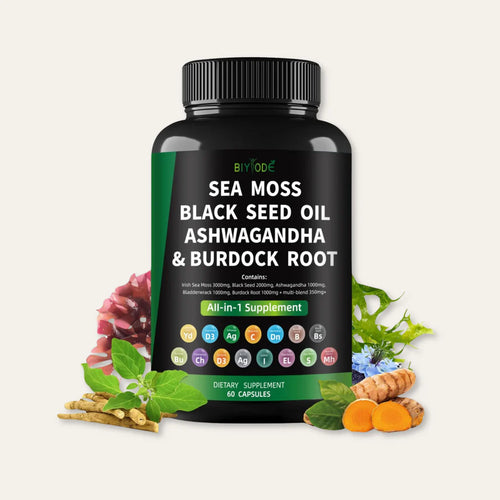How to Choose the Right Omega-3 Fish Oil Supplement for You
Omega-3 fish oil supplements are one of the most popular and widely recommended health products available today. Backed by decades of scientific research, these supplements offer a wide range of benefits, from supporting heart health and brain function to improving joint mobility and reducing inflammation. However, with hundreds of products on the market, selecting the right Omega-3 fish oil supplement can feel overwhelming. Factors such as purity, potency, source, and form all play a crucial role in determining the effectiveness of a product. In this guide, we will explore everything you need to know to choose the best Omega-3 fish oil supplement for your individual needs.
All supplements offered by biyode.org are made with the highest-quality natural ingredients.
Understanding Omega-3 Fatty Acids
Omega-3 fatty acids are essential fats that the body cannot produce on its own. They must be obtained through diet or supplements. The two most important types of Omega-3s found in fish oil are EPA (eicosapentaenoic acid) and DHA (docosahexaenoic acid). EPA is known for its anti-inflammatory properties and benefits for heart and joint health, while DHA is vital for brain health, cognitive function, and eye health. Together, EPA and DHA contribute to overall well-being and play a key role in preventing chronic diseases.
Why Take Omega-3 Fish Oil Supplements?
While it is possible to get Omega-3s through fatty fish such as salmon, mackerel, and sardines, many people do not consume enough fish regularly to meet recommended levels. Omega-3 fish oil supplements offer a convenient way to fill this nutritional gap. They are especially beneficial for individuals with limited access to fresh seafood, vegetarians who may lack marine Omega-3s, and those with increased needs due to aging or specific health conditions. Regular supplementation with a high-quality Omega-3 fish oil has been shown to support cardiovascular health, cognitive performance, mood stability, joint flexibility, skin health, and even prenatal development.
Factors to Consider When Choosing an Omega-3 Fish Oil Supplement
1. Purity and Safety
Purity is one of the most important considerations when choosing an Omega-3 fish oil supplement. Fish can accumulate toxins such as mercury, lead, and PCBs (polychlorinated biphenyls) from polluted waters. A high-quality supplement undergoes molecular distillation or other purification processes to remove these contaminants. Look for products that are third-party tested for heavy metals and other impurities. Certifications such as IFOS (International Fish Oil Standards), GOED (Global Organization for EPA and DHA Omega-3s), or NSF International provide assurance of quality and safety.
2. Source of Fish Oil
The source of the fish oil determines not only its nutritional profile but also its sustainability and potential for contamination. The best Omega-3 fish oil supplements use oil derived from small, cold-water fish such as anchovies, sardines, and mackerel. These fish are lower on the food chain and accumulate fewer toxins compared to larger fish. Additionally, look for products sourced from sustainable fisheries that follow environmentally responsible practices.
3. EPA and DHA Content
Not all Omega-3 fish oil supplements are created equal when it comes to EPA and DHA content. Many products highlight the total amount of fish oil per serving, but what truly matters is the amount of EPA and DHA provided. A high-quality supplement should contain at least 500 mg of combined EPA and DHA per serving, though higher concentrations are often recommended for specific health goals. Carefully read the supplement facts label to determine how much EPA and DHA you are getting.
4. Form of Omega-3s
The form of Omega-3s in a supplement affects how well they are absorbed by the body. Natural triglyceride and re-esterified triglyceride forms are generally considered the most bioavailable, meaning they are more easily absorbed. Ethyl ester forms, which are common in cheaper supplements, may have lower absorption rates. Phospholipid forms, found in krill oil, also offer excellent bioavailability and additional benefits such as enhanced antioxidant protection. Understanding these differences can help you choose a product that delivers the best results.
Note: Advantages of Omega-3 fish oil offers a remarkable array of health benefits that extend from head to toe.

5. Freshness and Oxidation
Fish oil is prone to oxidation, which can lead to rancidity and diminished effectiveness. Consuming oxidized fish oil can also contribute to oxidative stress in the body. To ensure freshness, choose products that include antioxidants such as vitamin E or rosemary extract to prevent oxidation. Additionally, check for freshness indicators such as the TOTOX (total oxidation) value, which reputable brands often disclose. Lower TOTOX values indicate fresher oil with less oxidation.
Comparing Soft Gels vs. Liquid Fish Oil
Omega-3 fish oil supplements are available in various forms, including soft-gels and liquid oils. Soft gels are convenient, easy to swallow, and have no fishy aftertaste, making them a popular choice for most people. Liquid fish oil can offer higher concentrations of EPA and DHA per serving and is ideal for those who prefer to avoid capsules or require higher dosages. However, liquid oils must be stored properly to prevent oxidation and may have a stronger taste.
Conclusion: Choosing the Right Omega-3 Fish Oil for You

Selecting the right Omega-3 fish oil supplement involves more than just grabbing the first bottle off the shelf. By considering factors such as purity, source, EPA and DHA content, form, freshness, dosage, and sustainability, you can make an informed choice that aligns with your health goals and values. High-quality Omega-3 fish oil can provide significant benefits for your heart, brain, joints, skin, and overall well-being. Take the time to research and compare products, read labels carefully, and choose a reputable brand that prioritizes safety and quality.



